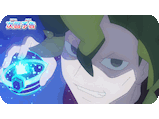
001



Main
Old Updates Archive
Links
 |
Lists |
List of Pokémon
Pokémon World Atlas
List of Techniques
List
of Items
List of TV Episodes
 |
Guides |
Episode
Comparisons
Movies
& Specials Guide
CD Guide
DVD Guide
Voice
Actors Guide
Lyrics Archive
Manga Guide
Video Games
 |
Miscellaneous |
Humor
Pokémon Bashing
Features
Rants
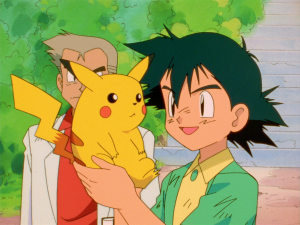
Japanese Episode 001: "Pokémon I Choose You!"
American Episode 101: "Pokémon I Choose You!"
Pokémon Dare Da? Pikachu
Japanese Air Date: April 1st, 1997
American Air Date: September 8th, 1998
Important Characters: Satoshi (Ash Ketchum), Shigeru (Gary Oak), Dr. Ookido (Professor Oak)
Important Places: Masara Town (Pallet Town), Tokiwa City (only mentioned in the Japanese version)
Meet Satoshi, a ten-year-old boy from Masara Town in the Kanto Region. Satoshi is excited because tomorrow he’s scheduled to receive his very first Pokémon from Dr. Ookido and begin his journey to become the greatest Pokémon Trainer ever. Unfortunately, Satoshi oversleeps on the fateful day and arrives at the laboratory after all the other Pokémon have already been handed out! The young boy pleads with Dr. Ookido to give him any Pokémon he has left and so the professor reluctantly hands over the ill-tempered Pikachu. The Mouse Pokémon doesn't want anything to do with the young Trainer at first but Satoshi is determined to become its friend regardless. Once out on the road, Satoshi makes a few unsuccessful attempts at getting his first Pokémon before accidentally upsetting a flock of wild Onisuzume. Satoshi and Pikachu run for their lives but, after borrowing a random girl’s bicycle and then promptly wrecking it, soon find themselves surrounded. Seeing no other way out of the situation, Satoshi stands between the flock and his battered Pokémon, impressing Pikachu and finally earning him its trust. Pikachu jumps up and unleashes a powerful electric attack that wipes out the entire flock in one powerful explosion. The next morning, Satoshi wakes up and witnesses a golden bird Pokémon in the sky that he'd never seen before. The Pokémon world is filled with so many wonders and mysteries, he realizes, but Satoshi can’t think about that now; he has to get Pikachu to the nearest Pokémon Center!
Thoughts
There isn't a lot I could say about the first episode of the original 1997 Pocket Monsters series that hasn't already been said by literally everyone else at this point, is there? We've all seen "Pokémon I Choose You!" a million times by now, and whenever anyone starts a video review series / podcast / social media thread they almost always start with this episode. So there is no shortage of opinions about this episode, that's for sure. At the same time, the "Thoughts" portion of this website's Episode Comparisons section is a space for me to give my review of each and every episode and so I guess I should throw my two cents in regardless.
I think the episode's...fine. Nothing great, but nothing terrible, either. One thing I keep thinking about during my more recent rewatches was what it must have been like for Japanese audiences to watch this episode back in 1997 and the context in which they were doing so. The Pocket Monsters Red & Green video games had been on sale for a little over a year by that point (April 1997) and had become this huge sensation unlike anything ever seen before. And so just about everyone tuning in would have already known all 151 Pokémon (plus the handful of Generation 2 Pokémon magazines like CoroCoro Comics were promoting), what kinds of attacks they can use, which Pokémon require trading or evolution stones to evolve, their Type match-ups, etc. They also would have known the games' human characters, the cities and forests and other locations, their general story, and the way the whole Pokémon Gym system works.
For Japanese fans, they weren't tuning in to some random cartoon they just happened to find on TV while channel surfing. They were tuning in, on purpose, to see how their beloved black and white Game Boy games were going to be turned into a full color animated TV show. Oh, they're not using the Red and Green main characters, they're using new ones loosely based off them. Masara Town sure is more spacious than it is in the games, huh? Hearing remixes of the video game music is really great! Oh look, they put Dr. Ookido's laboratory at the top of a big hill. Monster Balls are a bit smaller than I had imagined, y'know?
I think that's part of the reason why this first episode is the way it is. It didn't have the burden of having to introduce fans to the very concept of Pokémon itself and so it allows itself to take its time and tell the story it has to tell at its own pace. It doesn't try to cram too much into its 22 minute runtime and instead lightly guides us on a journey that ends up with a ten-year-old boy fighting off a bunch of birds. It's not a particularly exciting first episode, but it doesn't have to be. It does the job it set out to do, and that's enough.
The English dub of this episode is, by modern anime dubbing standards, pretty bad, but by late 1990s 4Kids standards it's...well, let's be real, it's not that great either. A lot of the things the 4Kids will be known for get their start here, and while there are episodes that will be dubbed more or less faithfully as time goes on this one provides us with a pretty decent baseline of what we can expect moving forward. I will say that one thing I love about the English dub of this episode, though, is how Veronica Taylor sounds as Ash. This is literally -- and I am fully serious here -- the best Ash sounds in the history of the English dub. I just love the performance here so, so much. It won't be long before Ash's voice starts to get higher pitched and the performance becomes more smarmy so I have to remind myself to enjoy it while I still can.
Pikachu, Dodrio, and the three starter Pokémon all keep their Japanese voices. When the starter Pokémon all get their proper debuts their voices will change for the dub, but in this episode, the little noises they make are the same in both versions.
Opening
Theme
The opening theme to the Japanese version, Mezase Pokémon Master, gets
replaced by a brand new song, the winner of the 1998 Award for Most
Creative Song Title Ever, "Pokémon Theme."
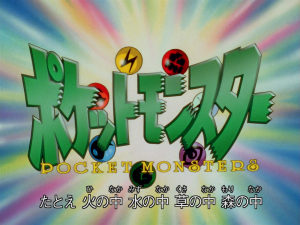 |
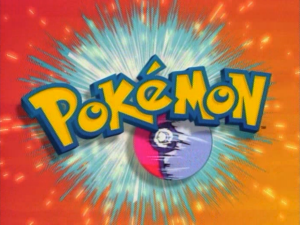 |
Back in the late
1990s it was common for anime distributors to come up with completely
brand new songs for their dubs (Sailor
Moon was the notable exception, and even then...) and so Pokémon doing the same thing
as pretty much everyone else
is not in the last bit surprising.
I did a detailed breakdown comparing the two
theme songs a while ago so check that out if you'd like to read
more.
Dialogue
Edit
The very first script change in the entire English
dub occurs during the episode's very first battle:
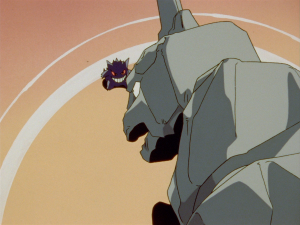
| Japanese
(original) |
Japanese
(translated) |
English
Dub |
| アナウンサー 「これは
イワークだ!さあイワーク巨体をいかしてたいあたり攻撃!これはどうだ?」 |
Announcer: "It's Iwark! And
now it's using its huge body to deliver a Tackle attack! How will
Gangar react?" |
Announcer: "Oh it's Onix! Now
this giant Pokémon's on the attack!" |
As you can see in the transcript above, the announcer in the Japanese version very clearly identifies the attack Iwark uses as "Tackle" while the English dub omits this little detail.
(But also...how do you make it all the way to this well attended tournament, one that's big enough that it's shown on TV, and then go "Hey, you know what I'm gonna use against this Ghost-Type? Freaking Tackle.")
We get introduced to our hero:
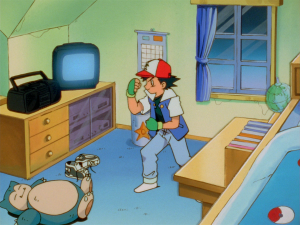
| Japanese
(original) |
Japanese
(translated) |
English
Dub |
| サトシ 「そう… オレ サトシ!」 |
Satoshi: "That's right, I'm
Satoshi!" |
Ash: "Yes! I am Ash!" |
| ナレーション 「そう… この少年
サトシ10歳。少年の住むマサラタウンでは…」 |
Narrator: "That's right. This
boy is Satoshi, ten years old. In the town this boy lives in, Masara
Town..." |
Narrator: "Ash Ketchum is a
boy from Pallet Town." |
| サトシ 「そうとも10歳になるとポケモン取り扱い免許をゆるされ…」 |
Satoshi: "...Ten year olds
like me are
able to get licenses to use Pokémon, and..." |
Ash: "And now that I'm ten I
can finally get my Pokémon license." |
| ナレーション 「街のポケモン研究家オーキド博士から初心者用ポケモン1頭をも らい…」 | Narrator: "...can then go
to their local Pokémon researcher Dr. Ookido to get a beginner's
Pokémon and... |
Narrator: "Ten-year-olds can
get a beginner Pokémon from Professor Oak, the town's
Pokémon expert." |
| サトシ 「ポケモントレーナーを目指して旅立てるのだ!そうさオレは全世界のポ
ケモンに宣言する。最高のポケモントレーナー…いや ポケモンマスター!そうともそれはオレだ!」 |
Satoshi: "...can then set
out on their Pokémon Trainer journey! So I declare to all the
Pokémon in the world; I will become the greatest Pokémon
Trainer... no wait, scratch that. I'll become a Pokémon Master!
Yeah, that'll be
me!" |
Ash: "I will journey to gain
the wisdom of Pokémon training. And I hearby declare to the
Pokémon of the world, I will be a Pokémon Master!
Pokémon Master! That is what I'll..." |
A few things are going on here. One, the entire dialogue in the Japanese version has this neat little thing where Satoshi and the narrator unknowingly finish each other's sentences, something the English dub doesn't bother trying to replicate at all. Two, the Japanese version's introduction of the concept of the anime-original term "Pokémon Master" (Lance's line in Red & Blue using a lowercase "m" doesn't count) is a little more smooth, implying the term may mean "strongest Pokémon Trainer," where the English dub just kind of abruptly throws the term at us without any warning whatsoever.
But the biggest thing the English dub does here is give the main character of this show a brand new name.
Side Note
The main character of this show, Satoshi, is renamed "Ash Ketchum" for the English dub.
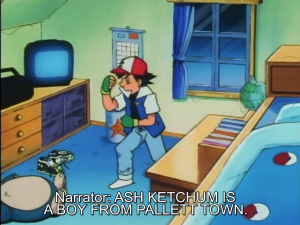
I'm of two minds about this. One, in an ideal world Satoshi and everyone else in this show would've been allowed to keep their original names, even in the United States. I don't think there's anything inherently wrong with having a bunch of Japanese kids go by Japanese names in a Japanese cartoon, even in the States. My attitude's always been that if the people who created this show had wanted to call him "Ash Ketchum" instead of "Satoshi" then they would have gone ahead and done so.
But on the other hand, I get it. This is a TV show based on a video game where nearly every single proper noun got renamed by Nintendo of America. And so for consistency's sake you have to keep the names the same across all media. If she's called "Misty" in the Game Boy games and trading card game but the TV show keeps referring to her as "Kasumi" then audiences would (rightfully) complain. And so all those localized names have gotta be used in the TV series as well. Anime original characters like Satoshi wouldn't necessarily be beholden to that same standard, sure, but at the same time having a show here half the cast has Japanese names and the other half have white people names would also be a bit odd. "Satoshi, Misty, and Brock fight against Musashi, Kojirou, and Meowth" just sounds strange, and also sorta-kinda lends idea to a headcanon that maybe not everyone's from the same part of the world? It's easier to just give everyone Western names and call it a day.
In the Japanese original, Satoshi is just "Satoshi"; in the character's 26-year tenure on the show Satoshi is never once given a family name. His mom Hanako's the same. The English dub, meanwhile, apparently didn't like having a main character without a last name and so they decided to randomly give him one, just 'cause.
Music Edit
After the dialogue above we get the first instance of the show replacing the background music in this show. Like many anime dubs of the era, the English dub of Pokémon unfortunately features a replacement music score.
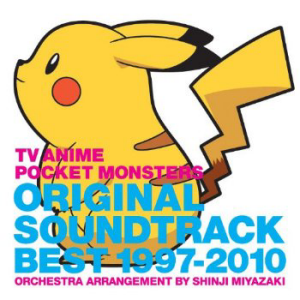 |
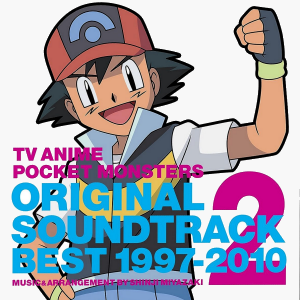 |
I go way more into detail about the music situation on this site's General Edits page, but for the episode "Pokémon I Choose You!," in particular only two pieces of music are retained from the Japanese version. The music during the televised battle at the beginning of the episode and the music that plays during the big showdown at the end between Pikachu and the flock of bird Pokémon are Shinji Miyazaki's tracks from the Japanese version, while literally everything else we hear in the dub is replacement music by Manny Corallo and John Lissauer. When you also factor in the dub music used to "fill in the gaps" whenever there are scenes that originally didn't have any background music in them then you're looking at the overwhelming majority of the dub of this episode (19:30 minutes of the show's 20:37 runtime) being replacement music.
Literally all of the music used in the Japanese version of this episode will go on to be used in later episodes of the English dub and so seeing it removed here is all sorts of frustrating.
Dialogue Edit
Professor Oak makes his TV debut, on TV:
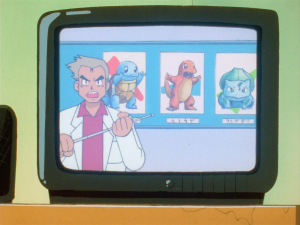
| Japanese
(original) |
Japanese
(translated) |
English
Dub |
| オーキド博士 「マサラタウンポケモン教養講座入門者編として最初におすすめし
たいポケモンは…フシギダネ、ヒトカゲ、ゼニガメのどれか1頭。どれを選ぶにしろそれぞれの長所と…」 |
Dr. Ookido: "For those of you
in Masara Town just starting your Pokémon education journey,
the Pokémon we recommend you start out with are Fushigidane,
Hitokage, or
Zenigame. No matter which one you choose, they all have their strengths
and..." |
Professor Oak: "Good evening
Pallet. Tomorrow's the big day for the newest class of Pokémon
students. I'd like to introduce you to Bulbasaur, Charmander, and
Squirtle. Each one is available for new trainees. Which one shall you
choose?" |
The English dub makes it sound as if Professor Oak is doing this TV show as a live broadcast. While that could still very well be the case in the Japanese version, it's also just as likely this is a pre-recorded video that Satoshi's tuning into at 11 o'clock at night.
Paint Edit
The very first use of digital ink and paint in this series is to remove some labels from Dr. Ookido's lecture we were able to see without any problems just a few seconds before.
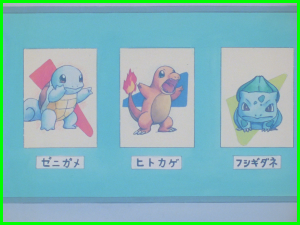 |
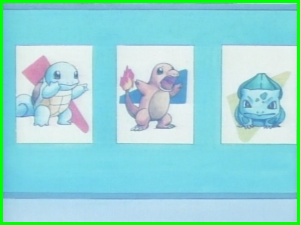 |
The labels in the Japanese version here are, from left to right, Zenigame (ゼニガメ), Hitokage (ヒトカゲ), and Fushigidane (フシギダネ).
Something you'll see me harp on over and over again for the next few dozen comparisons or so is how I really don't like the edits like these where 4Kids just erases the text (or in this case the whole entire label) without bothering to put anything back in its place. We just go from the characters' names written out to nothing at all. Now if they had rewritten the labels so that they now read "Squirtle," "Charmander," and "Bulbasaur," like in this quick mock-up I did below, then that'd be great because at least then you could justify the edit by saying you're translating something for the dub's primarily English speaking audience.
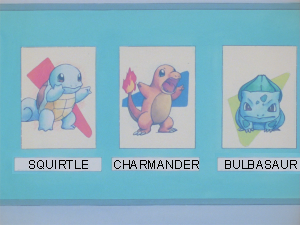
But because they don't do that, and they just erased the text altogether, you lose the "translation" justification for spending the time and money to make the visual edit. And so then what are you left with? The change was made in a clumsy attempt to hide the fact that this show came from Japan? The change was made because there's something inherently wrong with the Japanese language in and of itself? The change was made because American networks don't like having foreign text on-screen, even though there are dozens and dozens of examples from this time period where that's clearly not the case? Whatever the reason is I'm sure it probably didn't age well.
I get a lot of pushback whenever I talk about this sort of thing, and that's fine. Not everyone agrees with me that removing an entire language out of a TV show is all sorts of problematic. But I do think that if you're one of the people who's OK with seeing text erased like this then you should also be perfectly fine if the opposite were to ever happen as well. It's only fair, after all.
Side Note
The episode's title screen is different depending on which version of this episode you're watching.
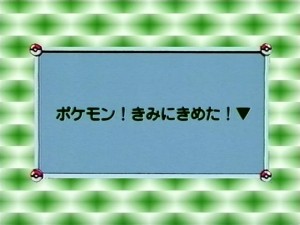 |
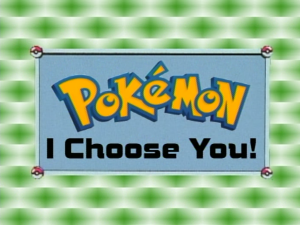 |
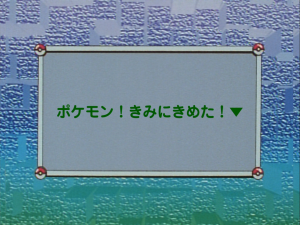 |
In Japan, most versions of of this first episode that're out there these days use the version on the bottom, the one that matches up with ever other title screen of the era. But apparently there are also some earlier releases that have the same green and white background you see in the English dub! There are multiple, multiple versions of this first episode available in Japan (by one fan's count there are about six different variations), and apparently this alternate green and white title screen can be found on the very first rental VHS release from 1997, though I don't have that particular version myself to verify. Thanks to Tommy for the heads up on this!
Michael Haigney, the English dub's script adaptor during these early 4Kids seasons, stated that "The Japanese version does have it, though, so I guess it was just taken from there" at the 10:10 mark of the first episode of his podcast Original Pokéman, so it seems that 4Kids maybe got an earlier version of the episode and used that as the basis for their dub.
In any case, the title screen will be the same in all versions starting with the next episode so this is just a one time edit.
Side Note
The character of Pocket Monsters' Shigeru is, as most Japanese fans understand it, lightly modeled on the character Mitsuru Hanagata from the classic baseball series Star of the Giants.
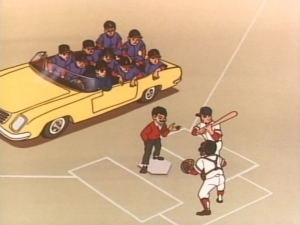 |
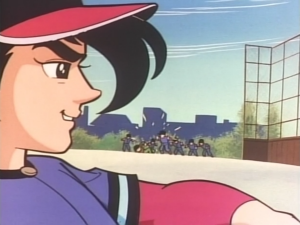 |
Mitsuru Hanagata is the snarky rival character to Star of the Giants' protagonist Hyuma Hoshi. While Hyuma and his family are dirt poor, often struggling just to make ends meet, Mitsuru grew up as the heir to his father's fortune and therefore had access to all the advantages that offers. After spending five years studying abroad in the U.K. Mitsuru returned to Japan where his growing ennui leads him to become a juvenile delinquent. One of the more famous images of him from the series is of him (illegally) driving a car with his nine other teammates all piled into the back like in the image above. Mitsuru looks down on Hyuma when he first meets him and plays a lot of really aggressive pranks on the poor kid throughout the series but, as time goes on, the two boys gain a trust and respect for each other as rivals.
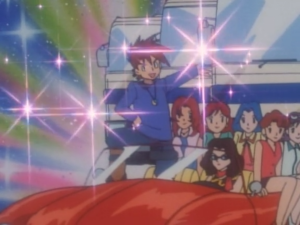 |
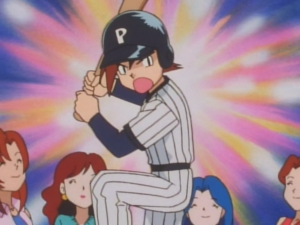 |
| These shots are from
Episode 031 "Look at All the Digda!" but you get the idea. |
|
There are obvious parallels between Mitsuru's and Shigeru's characters, though the two have enough differences that they're each able to stand on their own.
Shigeru's name, meanwhile, seems to come from Shigeru Miyamoto, the world famous Nintendo developer who also helped out during the development of the original Pocket Monsters Red & Green (he's the one who suggested they split the game into different versions to incentivizes trading, for example). Naming the stuck up rival character of this show after Shigeru Miyamoto might not be the most flattering thing the series could have done but if you're going to have Satoshi (Tajiri) always falling behind someone then there's really no one better to fill that role than Shigeru (Miyamoto).
Dialogue Edit
Ash "meets" Gary:
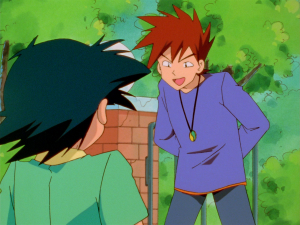
| Japanese
(original) |
Japanese
(translated) |
English
Dub |
| サトシ 「あっ! イテテテ…」 |
Satoshi: "Ah! Ouch..." |
Ash: "Ah! Uh~" |
| シ
ゲル 「痛いのは こっちだ!ん…!? お前は サトシだな!はいはい サ~トシさんだよ。サトシ君は最初から遅刻かい?」 |
Shigeru: "Hey, that's my line!
Huh? Well if it isn't Satoshi! Yeah, I remember you. It's Mr. Sa~toshi
himself! So you got a late start, Lil' Satoshi?" |
Gary: "Hey, watch where you're
going. Well, you must be Ash. Better late than never, I guess. At least
you get the chance to meet me." |
| サトシ 「シゲル…」 |
Satoshi: "No..." |
Ash: "Gary?" |
| シゲル 「“シゲル君”だよ。“君”をつけてくれよ。しかし今日
遅刻するようじゃ。ボクのライバルとしてすでにキミは初めからコケってる」 |
Shigeru: "That's 'no, sir' to
you. Don't forget the 'sir' at the end there. But it looks like you're
already running late. Ugh, to think my rival's getting off to such a
pitiful start" |
Gary: "Mr. Gary to you. Show
some respect. Well Ash, you snooze, you lose. And you're way behind
right from the start. I've got a Pokémon and you don't." |
The big change here, obviously, is that Satoshi and Shigeru already know each other when they meet in front of Dr. Ookido's laboratory in this episode while Ash and Gary are apparently just meeting each other for the first time. This random 4Kids rewrite will come back to bite them years later when we see flashbacks that prove that the two of them have actually known for quite a while before this point.
Professor Oak finds Ash:
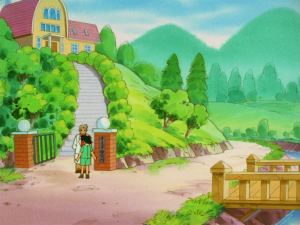
| Japanese
(original) |
Japanese
(translated) |
English
Dub |
| オーキド博士 「そういえば
今日の予定は4人と聞いていたが…だがボウヤ、パジャマで修行に行くのか?」 |
Dr. Ookido: "Now that I think
of it, there were supposed to be four Trainers scheduled for today. But
are you really planning to train in your pajamas, kid?" |
Professor Oak: "You look like
you're ready for bed, not for Pokémon Training. I hope you don't
think you're going to train in your pajamas." |
| サトシ 「パジャマはジャマ!ボヤボヤしてて遅刻したけどボウヤじゃありませ
ん。オレ10歳の少年です。とにかくオレにもポケモンを!」 |
Satoshi: "Forget this pajama
drama! I may've overslept but I'm not a little kid anymore. I'm already
ten years old! So come on, give me a Pokémon too!" |
Ash: "Oh, no, professor. I got
messed up this morning and..and I was a little late. But believe me,
I'm ready for a Pokémon." |
Dr. Ookido tells us that Satoshi's the fourth of four Trainers scheduled to come by that day, something Professor Oak doesn't bother to mention in the English dub.
The 20th Pokémon movie, 2017's "Pokémon I Choose You!" spends its first section retelling the events of this episode, with some scenes even having quotes taken directly from this episode. Dr. Ookido's line above is one such line. The Japanese line is the same in both versions but in the English dub TPCi decides to translate Professor Oak's line more faithfully ("Ah, so you're the last of the four young ones starting out on their journeys today") than it is here.
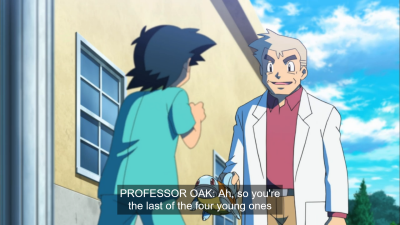
We then get Satoshi's line, which contains the first of many, many play on words in the Japanese version that 4Kids will have to deal with. Dr. Ookido calls Satoshi a bouya (坊や), which is like calling him a "little boy" or "kid." Satoshi responds by saying that he may have been boya-boya (ボヤボヤ), "to be careless" or "absentminded" but that he's no bouya (坊や); he's already ten years old, after all! The play on words with bouya (坊や) and boya-boya (ボヤボヤ) doesn't work in English and so 4Kids just ignored it altogether.
Paint Edit
Each of the Poké Balls Ash picks up have the name of the Pokémon they contain airbrushed out, even though the names were left as-is just a few seconds before.
Zenigame (ゼニガメ):
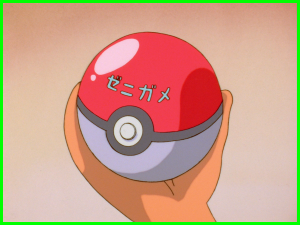 |
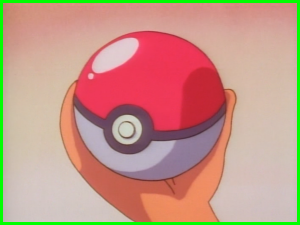 |
Fushigidane (フシギダネ):
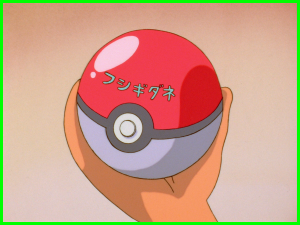 |
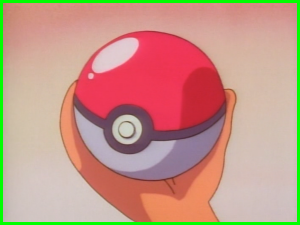 |
And Hitokage (ヒトカゲ):
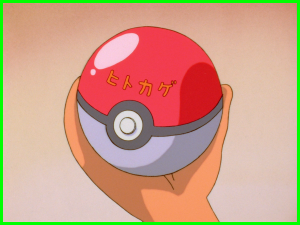 |
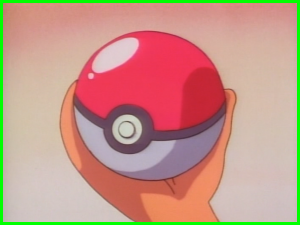 |
I imagine for this edit 4Kids just took a single shot, removed the name, and then swapped in the other two identical shots for their newly edited one.
Again, 4Kids should've written out the characters' English names on each of the balls here to replace the Japanese ones they erased but they unfortunately decided not to go that route.
Dialogue Edit
Ash fails to get his third Pokémon:
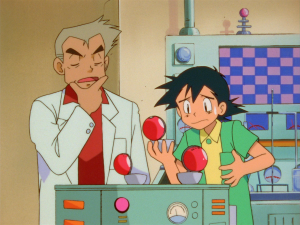
| Japanese
(original) |
Japanese
(translated) |
English
Dub |
| オーキド博士 「通勤電車もポケモンも一秒の遅れが人生を変える」 |
Dr. Ookido: "Pokémon
are like commuter trains; being even one second late can change your
whole life." |
Professor Oak: "The early bird
gets the worm. Or in this case, er, the Pokémon." |
The English dub adds in a reference to real world animals (birds, worms) that isn't there in the original.
In the movie "I Choose You!" Professor Oak's line here is translated correctly ("Being a second late for a train, or even a Pokémon, can be life changing"), which is nice.
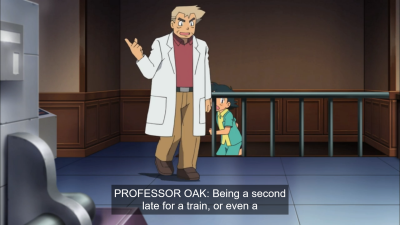
Professor Oak tries to warn Ash about Pikachu:
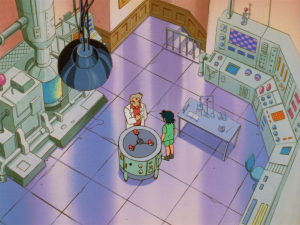
| Japanese
(original) |
Japanese
(translated) |
English
Dub |
| オーキド博士 「この残りポケモンにはちと 問題があってな…」 |
Dr. Ookido: "There is a bit of
a problem with this remaining Pokémon though..." |
Professor Oak: "I think I
should warn you there is a problem with this last one." |
| サトシ 「オレが遅刻したことにも問題があります」 |
Satoshi: "Well, me being late
is a bit of a problem too." |
Ash: "I have to have a Pokémon." |
| オーキド博士 「ならば!」 | Dr. Ookido: "Well, in that
case!" |
Professor Oak: "Well, in that
case..." |
Satoshi's self deprecating observation getting removed from the dub is pretty apparent from looking at the transcripts above (though Movie 20 restores it as "Since I was late, then I've got a problem with me, too!"), but something else that gets changed here is the delivery of the professor's response. In the Japanese version Dr. Ookido is apparently impressed by Satoshi's self awareness and so Unsho Ishizuka delivers his line as if he's eagerly cheering this young boy on, but in the English dub Stuart Zagnit's delivery makes it sound like Professor Oak still has some reservations about what's about to happen.
Side Note
Ash's reaction to Pikachu offers a great opportunity to talk about Pokémon and third person pronouns.
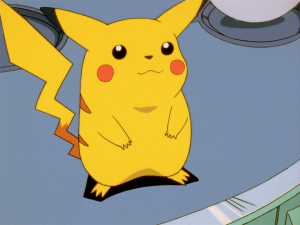
| Japanese
(original) |
Japanese
(translated) |
English
Dub |
| オーキド博士 「ピカチュウというポケモンじゃ」 |
Dr. Ookido: "This
Pokémon's named Pikachu." |
Professor Oak: "Its name is
Pikachu." |
| サトシ 「わあ かわいい!最高じゃないですか!」 |
Satoshi: "Wow, so cute! Isn't
this just the best?" |
Ash: "Oh, it's so cute, it's
the best of all!" |
In the English dub, 4Kids uses the pronoun "it" to refer to the overwhelming majority of the show's Pokémon characters. And it's not just Pikachu, either. Whether it's the Gengar on TV at the beginning of the episode ("Its training is top notch!"), the Bulbasaur in Ash's dream ("Raising Bulbasaur, that'd be really simple. It's perfect...for beginners"), Gary's Squirtle ("That's right loser, and it's right inside this Poké Ball"), or basically any other Pokémon in this show that isn't Team Rocket's Meowth, 4Kids consistently uses "it" to refer to the Pokémon instead of "he" or "she."
This is not something that happens in the Japanese version because of the way the Japanese language works. The explanation for why that is gets a bit long so if you're interested check out this write up I did on the General Edits page.
Dialogue Edit
Ash gets acquainted with his first Pokémon:
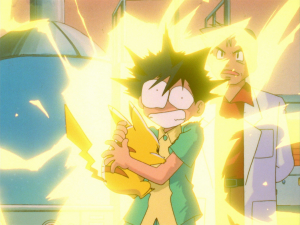
| Japanese
(original) |
Japanese
(translated) |
English
Dub |
| サトシ 「うわ~ これって…」 |
Satoshi: "Ah! What's going
on..." |
Ash: "Eeeeeeeeeeee!" |
| オーキド博士 「別名、電気ネズミ。はずかしがりやのくせに人になれにくくヘタ
にさわるとそうなる」 |
Dr. Ookido: "This little guy's
also known as the Electric Mouse. Even though it's shy it doesn't take
well to humans and so it'll do all this if you don't handle it just
right." |
Professor Oak: "It's also
known as Electric Mouse. It's usually shy but can sometimes have an electrifying personality." |
| サトシ 「先に 言ってちょうだい…」 |
Satoshi: "You coulda said that
before..." |
Ash: "I see what you mean." |
| オーキド博士 「うん 先に行くかね?」 |
Dr. Ookido: "Don't you mean
you shoulda been here before?" |
Professor Oak: "Shocking, isn't it." |
The electricity puns here are all 4Kids originals. I think a lot of fans assume that every time there's a joke in the 4Kids dub then that means there was a joke in the Japanese original but a lot of the time that's simply not the case. Sometimes 4Kids will just add jokes in whenever they feel like it, and other times they'll remove jokes they don't want to bother with, nevermind what's there in the original. It's not always a one-for-one exchange.
Paint Edit
The text on the banner being held up by Ash's...neighbors? friends? Mom's friends? have the text Ganbare Satoshi! (ガンバレサトシ!), or "Good luck Satoshi!," written on it in Japanese. This gets translated to "Go Ash Go!" for the English dub.
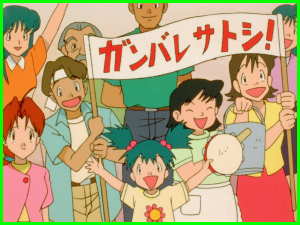 |
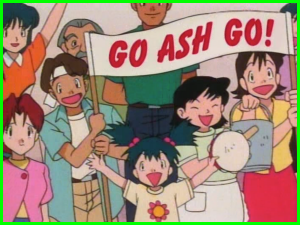 |
Unlike the paint edits earlier in this episode, ones like this are perfectly OK in my book. That's because this time around they're actually taking text the majority of the show's American target audience cannot read and then, instead of just erasing it calling it a day, actually take the time to translate it into a language they do understand. This is a very good thing.
Unfortunately these types of text replacements will start to appear less frequently in favor of the earlier types of edits where 4Kids just erases the Japanese text but then doesn't bother to put anything in its place. I understand it takes more work to do visual changes like this one (you have to select a font, choose words that'll fit within the space given, account for any other animation elements that may be present, etc.) but I also feel like if they're going to take the time to load up a scene onto their Windows 98 workstation or whatever to erase the text then they can also take the little bit of extra time it takes to type out some replacement text.
Interestingly, 4Kids didn't bother to edit the Japanese ガ symbol into the letter G in this shot here:
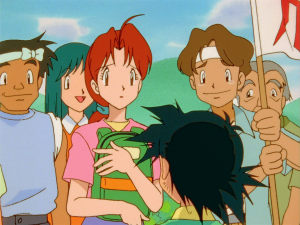
I would also like to point out that the "Go Ash Go!" version of this scene is also apparently used in versions of this show where Satoshi's localized name isn't Ash; the French dubs don't further localize this by re-painting it to say "Go Sacha Go!" for example.
Dialogue Edit
Ash's mom lists out all the things she's prepared for her son's journey:
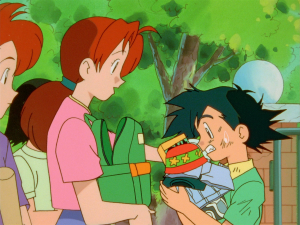
| Japanese
(original) |
Japanese
(translated) |
English
Dub |
| サ
トシのママ 「ほら!
くつにジーンズ、シャツにパンツに、食べ物は防災用にうちにあったインスタント食品をつめこんでおいたからね。炊事用にゴム手ぶくろ、洗濯物をかわかすヒ
モもあるからね。」 |
Satoshi's Mom: "Look, I've
packed your sneakers and jeans, shirts and underwear, and for food I'm
giving you some of the instant emergency rations we had back at the
house.
There're
rubber gloves for doing the dishes, and a clothesline to hang up your
clothes..." |
Ash's Mom: "I packed your
sneakers and jeans, nice clean shirts and underwear, and your favorite
snacks. And some hot chocolate in case you want something hot, but be
careful not to burn yourself. And a pair of rubber gloves to do your
laundry, and a new clothesline to hang it out to dry..." |
| サトシ 「もういいよ。ゲサゲサだよ、こんな見送り。オレが究極のポケモント
レーナーになってこの街に戻ってきた時にしよう。」 |
Satoshi: "OK, that's enough.
And what's with all these people? Shouldn't we wait to do all this once
I've
come back
from becoming the ultimate Pokémon Trainer?" |
Ash: "Mom, you're embarrassing
me. In front of all these people? Don't you know I'm a big kid now?
Pokémon Trainers can take care of themselves." |
| サトシのママ
「それもそうだ」 |
Satoshi's Mom: "Yeah, I guess
you're right." |
Ash's Mom: "I understand." |
4Kids' script is pretty accurate until it starts talking about hot chocolate, which in the original was Satoshi's mom giving him emergency rations. The reason for packing rubber gloves differ between the two versions as well.
Ash's Mom notices his Pikachu and how odd it's acting. Ash then says this:
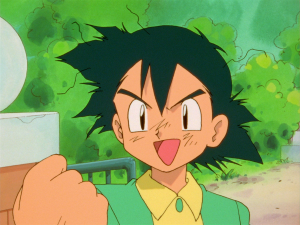
| Japanese
(original) |
Japanese
(translated) |
English
Dub |
| サ
トシ 「オ… オレは
このピカチュウで世界中のポケモンをゲットだぜ!」 |
Satoshi: "Wi...with this
Pikachu, I'll be sure to get Pokémon all over the world!" |
Ash: "With Pikachu at my side,
I'll get all the Pokémon in the world!" |
This will actually come up later in the episode, but the original doesn't ever state that Satoshi's goal is to get all the Pokémon in the world as that would actually trigger an ecological catastrophe. Originally he just wants to travel around and get Pokémon from all sorts of different places around the world.
Ash's Mom calls Pikachu "weird," prompting it to electrocute its new Trainer's send-off party. After that, Ash's Mom says this:
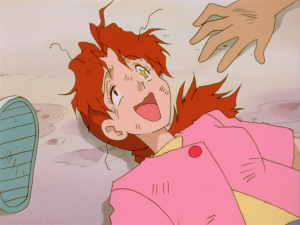
| Japanese
(original) |
Japanese
(translated) |
English
Dub |
| サ
トシのママ 「寝る時にはパジャマに着がえんのよ…そんなパジャマでもね…」 |
Satoshi's Mom: "Make sure to
change into your pajamas when you go to bed...you know, the ones you're
wearing
right now..." |
Ash's Mom: "Don't forget to
change your underwear ...every single day." |
And thus Delia's dub-only obsession with her son wearing clean underwear is born! Literally the only time Satoshi's mom ever brings up her son's underwear in the Japanese version, as far as I'm aware, is in that previous scene where she lists out all the items she packed for her son's journey. Basically every other time the character brings up her son's underwear (like in this quote above) is a 4Kids rewrite.
Once they're on the road, Ash tries to talk to his Pikachu:
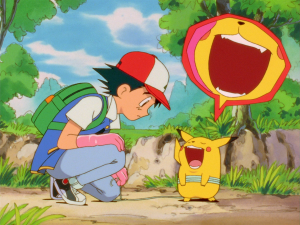
| Japanese
(original) |
Japanese
(translated) |
English
Dub |
| サトシ 「キミはオレがきらい?」 |
Satoshi: "Do you not like me?" |
Ash: "Is it because you don't
like me?" |
| ピカチュウ 「ピカピカ」 |
Pikachu: "Pika Pika" |
Pikachu: "Pika Pika" |
| サトシ 「オレはキミが好きだよ。一応キミはオレに かわれているポケモンなんだから少しは話を聞いてくれてもいいんじゃない?」 | Satoshi: "Well, I like you.
And since you're the Pokémon I'm taking care of now can you at
least not be so ruthless and listen to what I have to say?" |
Ash: "Well I like you a lot. And since you're the Pokémon I'm training, don't you think you could be a little nicer and just open your mouth and tell me what's wrong?" |
| ピカチュウ 「キャア~」 | Pikachu: "Kyaa~" |
Pikachu: "Kyaa~!" |
| サトシ 「歯はある…“ハナシ”じゃない… 」 | Satoshi: "You're saying you do
have
teeth...? Oh, I said "ruthless," not "toothless." |
Ash: "Well, that's not exactly...what I meant." |
Originally, there's a Japanese pun here involving the words hanashi (話), which in this context means "what I have to say," and ha nashi (歯なし), which means "no teeth." Satoshi asks Pikachu to listen to his hanashi ("what I have to say"), but the mouse Pokémon thinks he's saying ha nashi ("no teeth") instead. So, it opens its mouth to show Satoshi that it does, indeed, have plenty of teeth.
It's one of many of those untranslatable things that 4Kids has not choice but to rewrite, and for what it's worth I think the "just open your mouth and tell me what's wrong" they came up with is a pretty decent workaround.
Their conversation continues:
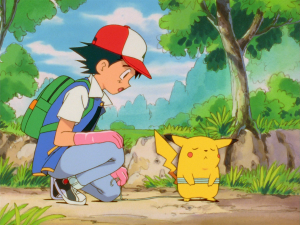
| Japanese
(original) |
Japanese
(translated) |
English
Dub |
| サトシ 「話したくないってこと?」 |
Satoshi: "You just don't feel
like talking?" |
Ash: "Is your name all you can
say?" |
| ピカチュウ 「ピカ」 |
Pikachu: "Pika" |
Pikachu: "Pika." |
| サトシ 「でもさあ、ポケモンはポケモンらしくモンスターボールに入ってくれ
たっていいだろ?」 |
Satoshi: "So then what could
it hurt for you to act like other Pokémon and just go into your
Monster Ball for me?" |
Ash: "Well then, you're just
like all Pokémon and you should act like one and get inside the
Poké Ball just like it says in the Pokédex." |
The Japanese version, as you can see, doesn't make any such claim.
Eyecatch
The English dub of Pokémon does what a lot of made-for-TV anime dubs weren't doing in the late 1990s and actually included the eyecatch!
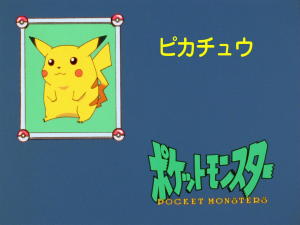 |
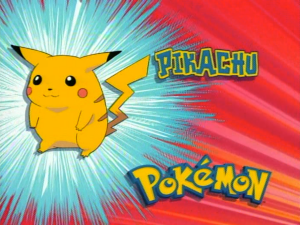 |
The visuals are completely different between the two -- the simple blue background gets replaced by the most gaudy series of special effects 90s computers had to offer, and the animators' original drawings of the Pokémon get replaced by stock artwork -- and the music's replaced as well, but as far as the formatting goes it's actually pretty decent. We hear a group of kids shout out "Who's That Pokémon!" (a decent rending of the Japanese version's Da~re da!) while a silhouette's shown on the screen, and then when we get back from commercial break they reveal the Pokémon's name and its full artwork.
The eyecatches provide 4Kids with yet another opportunity to teach its audience these characters' names (you can't ask your parents to buy you Pikachu merchandise if you don't even know its name!) so I'm sure that's the only reason they even bothered to leave them in. But it's still nice to see regardless. As mentioned above, anime dubs in the 1990s usually just cut the eyecatches from the English version and so to see Pokémon, of all dubs, leave them in is really something else.
Dialogue Edit
Ash tries to get his first Pokémon:
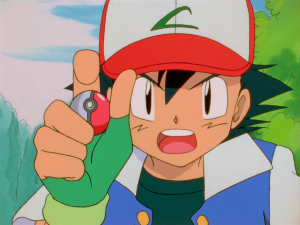
| Japanese
(original) |
Japanese
(translated) |
English
Dub |
| サトシ 「そうさ、オレは全世界のポケモンに宣言するんだ。オレは決めた!最高
のポケモンマスター…それはオレだ!そのオレがポッポ1羽つかまえられなくてどうする!」 |
Satoshi: "Alright, I declare
to
all the Pokémon in the world. I've made up my mind! I'll be the
one who becomes the world's greatest Pokémon Master! But I won't
get there if I can't even get a single Poppo!" |
Ash: "Alright, I've pledged to
get all the Pokémon in the world. Now I'm ready to take the next
step to be the number one...Pokémon Master. Enjoy your last
moments of freedom, Pidgey, 'cause you're mine!" |
Again, Satoshi's goal isn't to "get all the Pokémon in the world," he just wants to become the greatest Pokémon Master. At no point in the original is it even implied that becoming a Gou-like character has anything to do with becoming a great Pokémon Master.
Also, Ash's "enjoy your last moments of freedom, Pidgey" has always felt weird and out of place to me. That's something you'd expect to hear from Team Rocket, not this show's ten-year-old protagonist!
The next few rewrites are quick little rapid fire ones. Ash figures out how to get Pokémon without Pikachu's help:
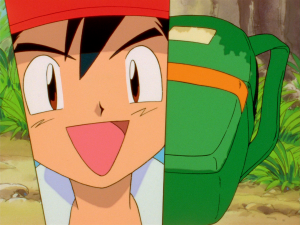
| Japanese
(original) |
Japanese
(translated) |
English
Dub |
| サトシ 「ん? そうだ!ピカチュウっと!」 |
Satoshi: "Hmm? That's it! A
Pika-chute!" |
Ash: "Wait! I've got an idea." |
There's a Pikachu-related pun (I'm guessing on the word "parachute," especially given what happens next) in the original that gets ignored in the dub.
After getting hit with Poppo's Sand Attack:
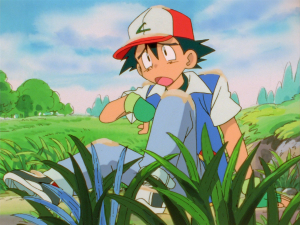
| Japanese
(original) |
Japanese
(translated) |
English
Dub |
| サトシ 「時計のポッポとは違うんだ」 |
Satoshi: "This isn't anything
like the Poppo clock in my room..." |
Ash: "Guess it's not my lucky day." |
Ash's Pokédex gives some information:
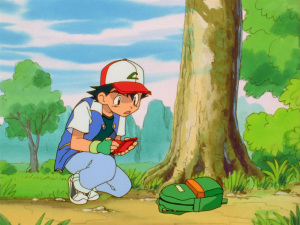
| Japanese
(original) |
Japanese
(translated) |
English
Dub |
| ポケモン図鑑 「森のポケモン“コラッタ”。木の実などの硬い物やチーズを好
む。」 |
Pokémon Bestiary:
"Koratta, a forest Pokémon. It likes nuts and other hard things,
as well as cheese." |
Pokédex: "A forest
Pokémon, Rattata. It likes cheese, nuts, fruits, and berries." |
| サトシ 「ちょっと! ここ森じゃない!野っ原じゃないか!」 |
Satoshi: "But wait a minute.
We're in an open field, not a forest!" |
Ash: "Yeah, but this isn't a
forest. It's an open field." |
| ポケモン図鑑 「たまに うかつな旅人の食料をねらって野原に出てくることもある。」 | Pokémon Bestiary: "It
sometimes comes out into open fields to target food from careless
travelers." |
Pokédex: "It also comes out
into open fields to steal food from stupid
travelers." |
| サトシ 「うかつって オレのことか?」 | Satoshi: "That means
I'm...careless?" |
Ash: "That means I'm...stupid?" |
As you can see, Satoshi's bestiary isn't quite as needlessly mean in the original as the dub makes it out to be, with it calling him "careless" instead of "stupid."
The scenes with Ash throwing a rock at Spearow and angering it, as well as the chase scene that follows, are all pretty accurate script wise. There isn't much dialogue in the first place for 4Kids to rewrite in the first place, but still.
Side Note
So this is pretty common knowledge by now, but the English dub usually keeps Ikue Otani's Pikachu voice as-is. I say "usually" because in these first few episodes of Season One the voice will sometimes get replaced by...I think the consensus is that it's Rachel Lillis...? for random bits here and there. This usually happens in scenes where you have multiple voices talking over each other because, back in 1998, all the voices were probably all on a single track instead of being separated out the way they would be now.
The voice replacement happens a few times in this episode. For example, Ash asks Pikachu "Should we run?" when it becomes apparent that the massive flock of Spearow is upset with them, and Pikachu responds with a voice that clearly isn't Ikue Otani's. The Pikachu replacement voice is...well, it's not great, but I guess it was the best they could do at the time given the circumstances.
Thankfully this is something that'll only need to happen a handful of times early in the season; I feel like by the time we get a third of the way into Season One this stops happening altogether.
Cut -- 1 second
When Kasumi fishes Satoshi out of the water she asks "are you OK?" Satoshi responds that he's fine, assuming she's referring to him. Kasumi gets upset at this, slaps him across the face, and angrily says she was talking about his Pokémon, not him. The actual slap gets removed from the dub, with 4Kids freeze framing the shot right before it.
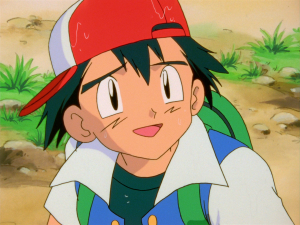 |
|
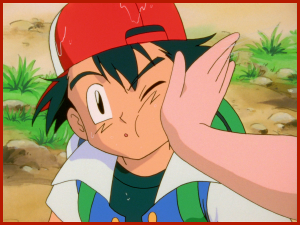 |
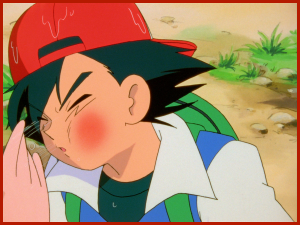 |
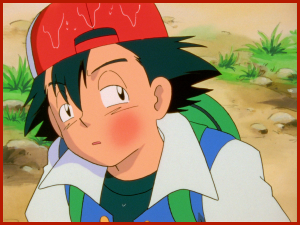 |
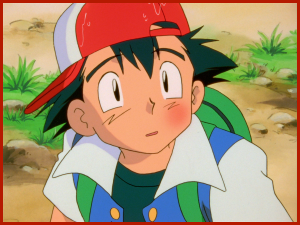 |
The dub leaves in the very next shot, however, that shows Kasumi with her slappin' hand still raised.
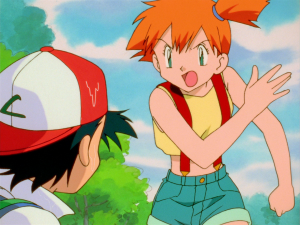
For a kids' show Pokémon is actually fairly violent (I mean, let's be for real for real; it's a glorified version of dog fighting) and so seeing BS&P draw the line at a kid slapping another kid, of all things, is actually pretty wild.
Dialogue Edit
To go along with the cut footage above, we get a slight dialogue change:
| Japanese
(original) |
Japanese
(translated) |
English
Dub |
| カスミ 「どうしてこんな目にあわせたのよ⁉ かわいそう」 |
Kasumi: "How did it get so
beat up!? The poor thing..." |
Misty: "Look what you've done to that poor little thing. Is it breathing?" |
| サトシ 「オレのせい… だよな」 |
Satoshi: "It's...well, it's my
fault." |
Ash: "Uh, uh...I think so." |
| カスミ 「ごちゃごちゃ言ってないで早く治療しなきゃ!この近くだとトキワシ ティのセンターで治療してくれるわ。早く!」 | Kasumi: "Well don't just sit
there, it needs medical attention ASAP! You can get it checked out at
the Pokémon Center in Tokiwa City not too far from here. So get
a move on!" |
Misty: "Well, just don't sit there. It needs a doctor right away! There's a medical center not too far from here. You've got to get moving now!" |
"Is it breathing"!? Jesus Christ this show got real dark all of a sudden!
Also, the dub removes the reference to the video game terms "Pokémon Center" and "Tokiwa City" ("Veridian City") in favor of the more generic "medical center." They'll remove a reference to Tokiwa City later when Ash is biking through the storm ("Just hang on now, Pikachu. We're almost there" originally had Satoshi telling Pikachu that they've only got a little ways to go before they reach Tokiwa City) so it does very much feel like an intentional change. I'm not really sure why though; those exact same terms will pop up over and over again as the series goes on!
Sound Effects Edit
During the stylized blue and white shots of Satoshi facing off against the Onisuzume 4Kids adds this kind of "whoosh" sound after every cut that wasn't there in the original. There are twelve of these sounds added altogether, with a bunch of them happening in rapid succession as Pikachu climbs up onto Ash's shoulder.
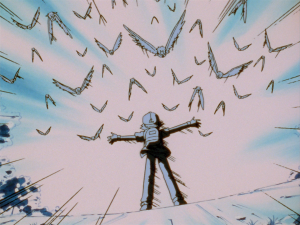 |
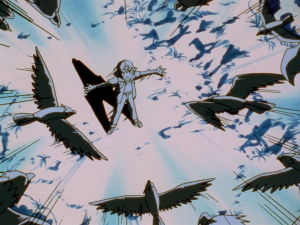 |
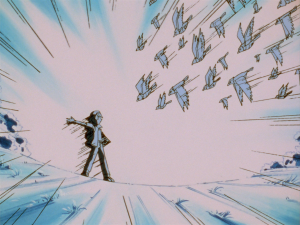 |
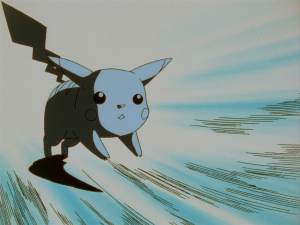 |
It's the most minor nothingburger of a change ever, but also...what was the point!? Did 4Kids feel like they had to compensate for the (intentionally) low frame count here or something?
Dialogue Edit
The last rewrite of the episode occurs during its ending narration:
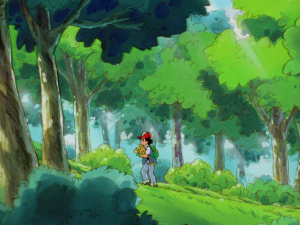
| Japanese
(original) |
Japanese
(translated) |
English
Dub |
| ナレーション 「これはまだまだポケモンのお話の始まりにすぎない。ポケットモ
ンスターちぢめてポケモン。少年サトシとピカチュウの前に壮大なポケモン世界のなぞと冒険が待っている。とはいうものの
今はボロボロのピカチュウとサトシ。彼らの明日に待っているのは光? それとも闇?キミが望む未来は?次回はほとんど見のがせない…ね?」 |
Narration: "This is only the
beginning of the story of Pokémon. Pocket Monsters, or
"Pokémon" for short. The mysteries and adventures of the vast
world of Pokémon await this boy Satoshi and his Pikachu. Well,
this beat up Satoshi and Pikachu, anyway. What lies ahead for our
heroes? Light? Or darkness? What do you hope happens? You won't want to
miss next week's episode...right?" |
Narrator: "This is just the
beginning of the amazing adventures of Ash and Pikachu. Their journey
is destined to be packed with non-stop action, millions of laughs,
heart-pounding perils, and endless excitement. Together they'll
encounter fantastic friends, evil enemies, and meet creatures beyond
their wildest imagination. And as their story unfolds, we'll unlock the
magic and mystery of a most wondrous place: the incredible world of
Pokémon." |
Aside from the complete rewrite, the starting point's a bit different; the narration in the Japanese version doesn't start until we cut to the shot I screenshotted above of Satoshi climbing the hill. The English dub's narrator, meanwhile, starts while Ho-Oh's still on the screen. A lot of this probably has to do with just how much more wordy the English version's narration is, a problem that could have easily been solved if they had written the narration to be closer to the Japanese one from the get-to...?
Ending Credits
In the Japanese version the ending credits are accompanied by a song Hyaku Gojuu-Ichi (ひゃくごじゅういち), or "A Hundred and Fifty-One." It's performed by voice actor Unshou Ishizuka in-character as Dr. Ookido.
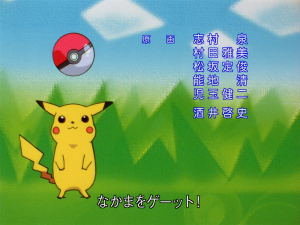
In the English dub, 4Kids uses an instrumental version of the show's opening theme and places that over footage of...the opening theme. It's a pretty slap-dash job, actually.
And that's it for the first episode! One down, only 1,000+ more to go!
This page was last updated on October 2nd, 2023
Found an error or omission? Please help me keep this page current and error-free by e-mailing me with a description of the issue.

